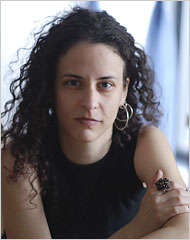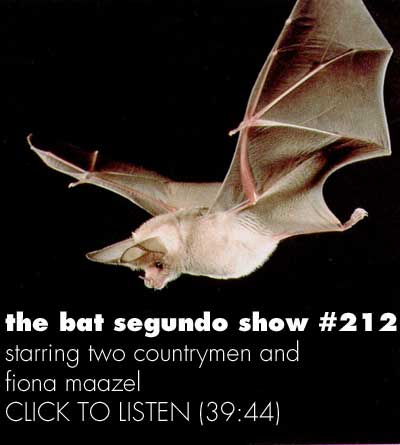The National Book Foundation has released its latest 5 Under 35 list and, aside from one regrettable selection made by an overrated, near humorless, and out-of-touch novelist who hasn’t produced any fiction in seven years, it’s a very fine list. And if you’re interested in plunging further, you can listen to Segundo conversations with Fiona Maazel and Nam Le.
Tag / fiona maazel
The Bat Segundo Show: Fiona Maazel
Fiona Maazel appeared on The Bat Segundo Show #212. Maazel is the author of Last, Last Chance.
[LISTENING NOTE! Please note that this show contains numerous grinding noises. We have endeavored to remove as many of these as possible, and reduce the noise where possible. Alas, SOME aural residue remains.]
Condition of the Show: Considering the niceties of superplagues.
Author: Fiona Maazel
Subjects Discussed: Being under observation, the relationship between kosher chickens and superplagues, rich WASPy girls, individual vs. societal ironies, keeping the protagonist’s name somewhat secret, Mary Shelley’s The Last Man, on not reading Camus for protective purposes, Panic in the Streets, the anxiety of influence, opting for a more realistic plague narrative, using humor to cantilever a dark narrative, devising multiple historical voices, pawing around in the dark, reincarnations, Groundhog Day as the essence of reincarnation, thongs and corporeal elliptical themes, the dangers of reading too fast, perceived titular homages to Nabokov, reviewers who are “certain” about books, auctorial intentions, moving around and setting a portion of the book in Texas, wanting to be T.S. Eliot, pursuing the grit, the pervasiveness of television, revolting against cultural media, Nordic tales, developing a conscious understanding of a deity, Stanley as a barometer, and agitprop.
EXCERPT FROM SHOW:
 Correspondent: If one looks at more lower brow choices, like Stephen King’s The Stand or The Andromeda Strain, or any number of superplague television series, like The Survivors and things like that, one tends to find a narrative that begins with the decimation of humanity. Yours is not that particular book. Again, going back to this question of inversions, I’m wondering if you made a particular choice. You had to have known about The Stand.
Correspondent: If one looks at more lower brow choices, like Stephen King’s The Stand or The Andromeda Strain, or any number of superplague television series, like The Survivors and things like that, one tends to find a narrative that begins with the decimation of humanity. Yours is not that particular book. Again, going back to this question of inversions, I’m wondering if you made a particular choice. You had to have known about The Stand.
Maazel: Sure, it’s true. But I didn’t think it was an inversion. I thought it was credible actually. I did a lot of research about plague and also about the CDC and bioterrorism. And just how unlikely the scenario I proposed is. It’s extraordinarily likely. This isn’t an alternate reality kind of novel. It didn’t seem likely that someone would unleash a plague and actually wipe out all of humanity. That’s just not credible. I wanted to come up with a credible scenario. So I guess from the perspective of someone writing fiction or reading fiction, one might expect something like a terrific slate wiper to come along, as we’ve seen in so many of these movies and books. But I actually wanted something that seemed really realistic. That only 3,000 people would die and the fact that they put a stop to it. For instance, when we had this little anthrax outbreak or even bird flu, people are dying, but they’re still containing it. I was more interested in the anxiety, the terror, the foreboding of what could happen. Might this thing wipe out a hundred million Americans or a hundred million people? That was more interesting to me than watching this disease tramp across the country and actually kill off half the United States.
Nine New Segundo Shows
This week, nine new installments of The Bat Segundo Show were released from the factory. I’ll be cross-posting the full capsules here at Reluctant Habits (the new preposterous name of this place) as soon as I find some time to complete them. (Books are now migrating their way to the new location, and this has been keeping me busy.) But for those who wish to plunge into the conversations right now, here’s a list of recent shows:
206. Sarah Hall. Hall, the recent winner of the James Tiptree Award, is an extraordinary writer. I’ve written a piece on all three of her books that will be appearing at another place. But in the meantime, you can listen to the nearly 70 minute conversation we conducted on her work as a whole. We carried out despite fire alarms and some lively debate.
207. David Hajdu. Hajdu is the author of The Ten-Cent Plague, but this conversation touches largely upon much of the journalistic methods he used in tracking down some of his subjects.
208. Tobias Wolff. This conversation has been excerpted elsewhere. Wolff was guarded, but he gradually warmed up as the conversation progressed, offering some interesting insights into how he puts together a short story.
209. Sloane Crosley. Ms. Crosley is regrettably known more for her shiny hair than her essays. Hopefully, this discussion will rectify this impression.
210. Cynthia Ozick. I was greatly honored to talk with the wonderful Ms. Ozick, winner of two recent lifetime achievement awards, a few days before her eightieth birthday.
211. Ed Park! Ed Park has written a very good debut novel. I had so many observations about his book that I had to cram into our conversation that we ended up talking for more than an hour.
212. Fiona Maazel. Despite the intrusive presence of a coffee grinder, Fiona and I managed to talk more or less intelligibly about Last, Last Chance.
213. Steven Greenhouse. I reviewed Greenhouse’s The Big Squeeze for the B&N Review last week. This conversation reflects some of my observations and delves into very important labor issues.
214. Ralph Bakshi. One of my most anarchic interviews, but in a very good way. If you aren’t aware of Bakshi’s accomplishments in underground animation (Fritz the Cat, Heavy Traffic, Coonskin), you’ll want to give this a listen.
215. Christian Bauman. We were ejected from a Midtown diner midway through our conversation, but this didn’t stop Mr. Bauman and I from discussing In Hoboken, which Mr. Bauman assures me is a “folk novel” and not a “rock ‘n’ roll novel.”
216. Mort Walker. The creator of Beetle Bailey reveals a number of unexpected attitudes about war and women.

